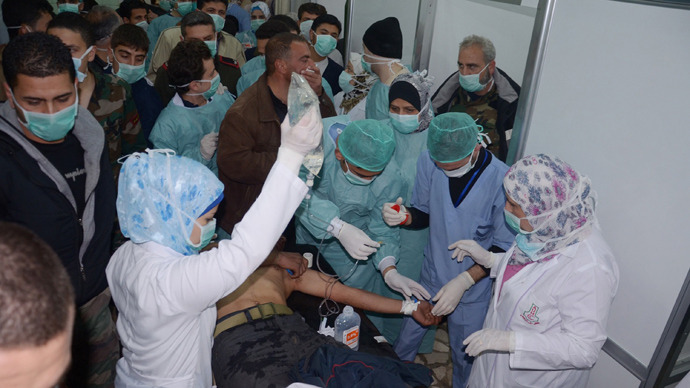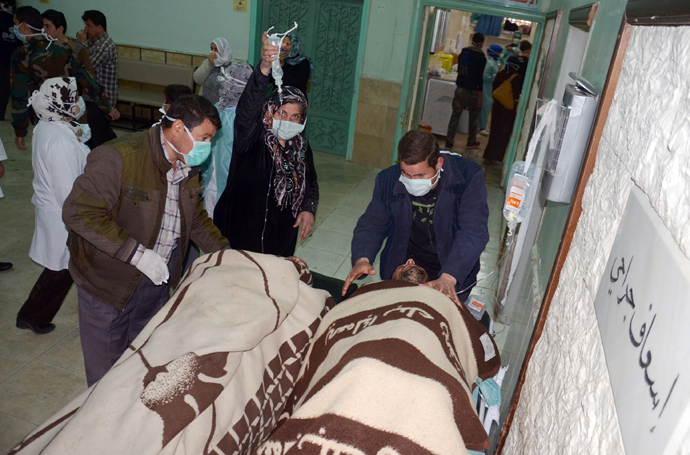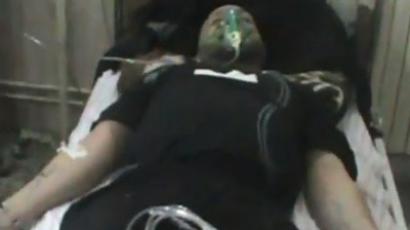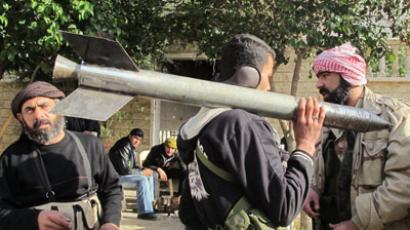Syrian govt, rebels urge UN investigation into ‘chemical attack’

Both the Syrian government and rebel forces are asking the UN to investigate an alleged chemical weapon attack on the outskirts of Aleppo that killed at least 25 and injured over hundred more.
On Tuesday a rocket reportedly containing chemical gas struck in the Khan al-Assal area north of Aleppo.
A local priest told RT that a doctor, who belongs to his church, was treating people, who suffered from what seemed to be chemical gas. Many of them could not breathe, Ibrahim Nseir said, adding that at least 25 were killed by the strike, some 130 were injured and 11 of them are critical.
The attack occurred in the area controlled by the government, a local journalist, who requested anonymity, told RT, adding that there is a military station that has been under attack for three weeks.
The biggest fear since the beginning of the crisis was that the opposition might take control of chemical weapons and that they might fall into the hands of extremist groups, the journalist explained.
He recalled that two months ago a video appeared of a Syrian opposition group claiming to be conducting experiments with chemical weapons. The group was calling itself “the killing wind” referring to a jihadist movement, the journalist said.

“This raises again the question – how difficult and how dangerous it is for these extremists groups, who have the same mentality of Al-Qaeda and certain jihadists groups to take control of chemical weapon,” he said.
Despite numerous reports and witness accounts the international community is hesitant over making final conclusions on the nature of the attack, with many calling for a thorough investigation.
Following the attack the US said it was looking carefully at the chemical warfare allegation coming from Syria, but called into question the possible use of such weapons by opposition groups.
Russia also said on Wednesday that the strike needs to be examined. “The alleged incident with the use of chemical weapons in Syria has to be thoroughly investigated. In the meantime there is no clear evidence,” Deputy Foreign Minister Gennady Gatilov wrote in his Twitter. Moscow has repeatedly warned about the dangers of such weapons falling into the hands of rebels, he added.
An Israeli official said it was "apparently clear" that chemical weapons were used in Syria. Yuval Steinitz, the newly appointed minister of intelligence and strategic affairs, did not elaborate on his conclusion and did not say whether it was Assad forces or the rebels that used the weapon.
Meanwhile, Britain has been quick to respond to the news with action. London is to airlift hundreds of chemical weapons detection and protection kits to Syrian rebels, The Telegraph reported on Wednesday. The package is a part of the first shipment of non-lethal equipment after the EU relaxed its arms embargo allowing supplies of non-lethal support for the protection of civilians.
Britain and France have been pushing for the lift of the embargo for a long time. On Wednesday, Germany joined the two with German foreign minister Westerwelle saying Berlin will "consider" changes to the EU arms embargo allowing Syrian rebels to receive weapons.
"We have two goals: to help and protect the people who suffer and to avoid a conflagration causing a chain reaction in the region," he said at an EU meeting in Dublin.
This is not the first time the Syrian government and rebels have accused each other of using chemical weapons. In December there were reports of the two sides accusing each other of using nerve agents.
A month later Bassam Al-Dada, a prominent member of the Free Syrian Army, claimed that rebels had all the components to produce chemical weapons and would use it if necessary. He also said that the opposition would use the weapon only if the government forces use it first.














